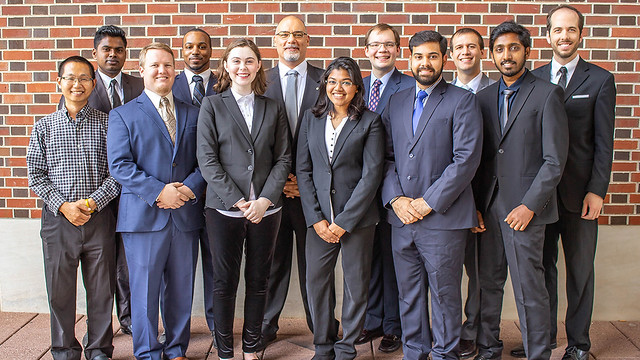Majdalani awarded NSF grant to improve combustors and power systems
Article body
Joe Majdalani, the Hugh and Loeda Francis Chair of Excellence in the Department of Aerospace Engineering, has been awarded a $387,000 grant from the National Science Foundation. The grant aims at developing fast, three-dimensional, stability prediction methodologies to improve the safety, performance and acoustic response of large combustors and power generation systems.
The Grant Opportunities for Academic Liaison with Industry (GOALI) project will pursue a unifying approach that can have a profound impact on both the aerospace and power generation industries. For example, understanding and suppressing the types of instabilities that evolve in large combustors can aid in the integration and scale-up of hybrid combustion technology and its adoption as a safe and clean propulsion alternative in both space and land applications.
This methodology, therefore, can be used to complement the design and development of large combustors and chemical rockets and thereby advances the country's defense capabilities. More specifically, the implementation of more stable propulsion concepts can potentially transform the nation's launch infrastructure with drastically reduced costs in space exploration, space tourism, satellite deployment and weaponry development.
“From preburners and boilers to jet engines and chemical rockets, understanding the mechanisms that induce unstable oscillations and structural vibrations remains a long-standing problem in the propulsion and power-generation industries,” Majdalani said. “Modern simulation tools remain slow, postdictive, model-sensitive and, in most cases, computationally expensive and highly dependent on the availability of experimental measurements. Our group is developing a three-dimensional stability framework that is grounded in fundamental physics, directly from first principles.”
In recent years, Majdalani’s research group has pursued cutting-edge strategies to predict acoustic wave structures in rocket engines, including cyclonically driven liquid and hybrid rockets under development by ORBITEC, Sierra Nevada Corporation, NASA, and San Diego Composites. With the help of Orie Cecil, Paul Kovacic, Michel Akiki, and Tharikaa Ramesh-Kumar, this team has led the evolution of an innovative spectral approach to capture thermoacoustic wave structures in one swoop, with no need to decompose the engine’s internal flowfield before solving for the characteristic frequencies. This NSF grant will help to extend the capabilities of these researchers to specialized solid and hybrid rockets as well as other combustors exhibiting oscillatory phenomena. It will also enable this group to consolidate their approach into one unifying framework that is capable of predicting not only the undesirable frequencies but also their maximum pressure amplitudes.
The development of a unified, physics-based, acoustic stability framework for rocket motors will provide the community with a much-needed diagnostic tool to quantify the behavior of acoustic oscillations in large combustors. It will also serve as a launchpad for several additional lines of research inquiry because the underlying methodology can be readily extended from solid and hybrid systems to liquid rockets, Nuclear Thermal Propulsion (NTP) engines, ramjets, preburners, augmenters and gas turbine engines. Ultimately, with the physics-based framework in hand, it will be possible for future combustors seeking higher performance to be operated more efficiently and closer to their stability limits.
“As the application of rocket propulsion technology for both commercial and defense applications continues to rise, it is critical that modern aerospace engineers, or rocket scientists, understand the thermoacoustic instability mechanisms that can significantly affect the performance of these systems,” said Brian Thurow, chair of the Department of Aerospace Engineering. “Dr. Majdalani’s work plays a critical role in advancing the tools we have to understand these phenomena and continues a long tradition of the department contributing to the advancement of aerospace propulsion technology.”
Brian Evans, chief engineer of Space Propulsion Group who serves with Majdalani on the Hybrid Rockets Technical Committee, is also a collaborator on the project. Evans will provide technical assistance that leverages his two decades of hybrid rocket design experience.
At Auburn, combustion instability is a growing area of research that is strengthened by work conducted by several other faculty members, including Butch Foster, Roy Hartfield and David Scarborough.
Related Media
Media interested in this story can contact Communications Director Preston Sparks at (334) 844-9999 or preston.sparks@auburn.edu.
Auburn University is a nationally ranked land grant institution recognized for its commitment to world-class scholarship, interdisciplinary research with an elite, top-tier Carnegie R1 classification, life-changing outreach with Carnegie’s Community Engagement designation and an undergraduate education experience second to none. Auburn is home to more than 30,000 students, and its faculty and research partners collaborate to develop and deliver meaningful scholarship, science and technology-based advancements that meet pressing regional, national and global needs. Auburn’s commitment to active student engagement, professional success and public/private partnership drives a growing reputation for outreach and extension that delivers broad economic, health and societal impact.





